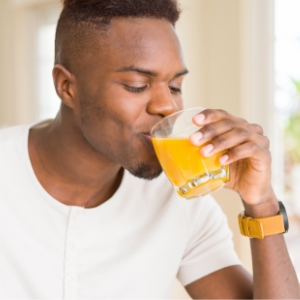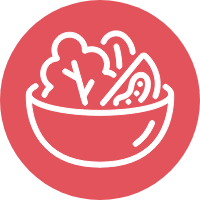- HealthBites for Diabetes Resource Hub
- Calcium: An Essential Nutrient For Your Bone Health
- How To Manage Your Cholesterol Levels
- How To Prevent And Treat Constipation
- How To Manage Your Diet and Health When You Have Diabetes
- How To Manage Diarrhea
- High Blood Pressure and Food Choices
- Everything You Need To Know About Probiotics
- What You Need To Know About Vitamin B12
- How To Manage Gas and Bloating
- Heartburn Relief
- Solutions To Manage Dry Mouth
- Celiac Disease: Gluten-Free Diet
- Osteoporosis Prevention: Keeping Your Bones Healthy
- The Importance of Vitamin C
- What You Need to Know About Folate
- What You Need To Know About Iron
- What You Need To Know About Potassium
- What You Need To Know About Magnesium
- What You Need To Know About Zinc
- What You Need To Know About Vitamin K
- All About Vitamin D
What You Need To Know About Iron

Iron is essential for your body to function. It is used to produce hemoglobin, which is needed in the production of red blood cells that carry oxygen to the entire body. Iron is also necessary to maintain healthy cells, skin, hair, and nails. Here is what you need to know to meet your daily iron needs and how to avoid iron deficiency.
Iron Rich Foods
Iron in food comes in two main forms: heme and non-heme.
- Heme iron can be found in foods from animal sources (such as red meat, poultry, fish, seafood).
- Non-heme iron comes from plant-based foods (such as dried fruits, molasses, whole grains, legumes, green vegetables, nuts, seeds).
Iron and Vitamin C
Most of the iron we consume is non-heme which the body doesn't absorb as well compared to foods that contain heme iron. Vitamin C increases the absorption of non-heme iron so combining foods that contain non-heme iron with vitamin C-containing foods can help increase your iron intake.
Here are some food combinations to help your body absorb iron:
- Spinach and strawberry salad
- Cereal with berries
- Pasta with tomato sauce
- Sautéed kale and red peppers
- Oatmeal with blueberries
- Leafy greens and lemon juice

Common Food Sources of Iron
See the table below for the iron content of some common foods.
| Food Group | Food | Serving size | Iron (mg) |
|---|---|---|---|
| Vegetables and Fruit | |||
| Spinach cooked | 125 mL (½ cup) | 3.4 | |
| Asparagus, raw | 6 spears | 2.1 | |
| Potato, with skin, baked | 1 medium | 1.9 | |
| Snow peas, cooked | 125 mL (½ cup) | 1.7 | |
| Turnip greens baked | 125 mL (½ cup) | 1.7 | |
| Green peas, cooked | 125 mL (½ cup) | 1.3 | |
| Tomato sauce | 125 mL (½ cup) | 1.2 | |
| Kale, frozen, cooked | 125 mL (½ cup) | 0.6 | |
| Grain Products | |||
| Cream of wheat, cooked | 175 mL (¾ cup) | 3.0 | |
| Cereal, dry | 30 g | 4.6 | |
| Oatmeal, instant, cooked | 175 mL (¾ cup) | 4.5 | |
| Soda crackers | 10 crackers | 1.7 | |
| Pasta, spaghetti, enriched, cooked | 125 mL (½ cup) | 1.0 | |
| Granola bar, fruit and nut | 1 bar | 0.6 | |
| Milk and Alternatives | This food group contains very little of this nutrient | ||
| Meat and Alternatives | |||
| Liver, cooked | 75 g ( 2.5 oz) | 9.7 | |
| Beef, cooked | 75 g ( 2.5 oz) | 2.4 | |
| Sardines, canned | 75 g ( 2.5 oz) | 2.2 | |
| Clams, canned | 75 g ( 2.5 oz) | 2.0 | |
| Seafood (shrimp, scallops, crab), cooked | 75 g ( 2.5 oz) | 1.4 | |
| Tuna, light, canned in water | 75 g ( 2.5 oz) | 1.2 | |
| Non-Meat Sources | |||
| Soybeans, dry, boiled | 175 mL (¾ cup) | 6.5 | |
| Tofu, raw, prepared with calcium sulphate | 175 mL (¾ cup) | 5.2 | |
| Lentils, cooked | 175 mL (¾ cup) | 4.9 | |
| Pumpkin or squash seeds | 60 mL (¼ cup) | 4.7 | |
| Beans (kidney, white, navy, pinto, black, adzuki), cooked | 175 mL (¾ cup) | 3.3 | |
| Baked beans, canned | 175 mL (¾ cup) | 3.2 | |
| Peas (chickpeas/garbanzo, black-eyed/cowpeas, split), cooked | 175 mL (¾ cup) | 2.9 | |
| Sesame seeds, roasted | 60 mL (¼ cup) | 2.5 | |
| Nuts (cashews, almonds, hazelnuts, macadamia, pistachio), without shell | 60 mL (¼ cup) | 1.4 | |
| Eggs, cooked | 2 large | 1.2 | |
| Other | Blackstrap molasses | 15 mL (1 Tbsp) | 3.6 |
Iron Deficiency
Decreased iron levels in the blood can lead to what is referred to as iron deficiency anemia. This problem can lead to various symptoms such as fatigue, weakness, and pallor. Some people may not experience any symptoms.
Iron deficiency anemia can have various causes including:
- Women with heavier menstrual flow
- Individuals with higher iron needs including: infants, children, premenopausal women and pregnant women
- Hemorrhage
- Conditions that affect iron absorption such as digestive disorders (celiac disease or inflammatory diseases) or cancer
- Vegetarianism and veganism
Most people with mild iron deficiency anemia won't notice it. Most common symptoms of iron defiency are:
- Abnormal fatigue
- Pale complexion
- A rapid pulse
- Increased shortness of breath during exercise
- Cold hands and feet
- Headaches
- Dizziness
- Decreased mental performance
Iron Supplements
Supplements can be useful to manage iron deficiency. Iron supplements or injections are used to increase the body's iron supply to promote hemoglobin production.
Oral iron supplements are available at the pharmacy. They can be prescribed or in some cases bought over the counter. Your iron levels should be checked through lab work before taking iron supplements.
Iron supplements can cause side effects such as a metallic taste, heartburn, nausea, constipation or dark stool. Always speak to a healthcare professional such as your pharmacist to determine if iron supplements would be beneficial.
Iron and Pregnancy
Pregnant women require 27 mg of iron per day and should not exceed 45 mg per day.
Iron is essential during pregnancy. It is a key component of proteins found in certain enzymes and in hemoglobin, which is responsible for oxygen transport. It is also crucial for the growth of the fetus and the placenta during the third trimester of pregnancy. It's for this reason, along with women's increased red blood cell mass, that women need to increase their iron intake during pregnancy.
The information in this resource is for general information purposes only and is not intended to replace informed medical advice. Consume foods according to any dietary guidelines you have been provided from a health care professional. Metro Ontario Pharmacies Limited assumes no legal liability for the accuracy, completeness or usefulness of the information.












